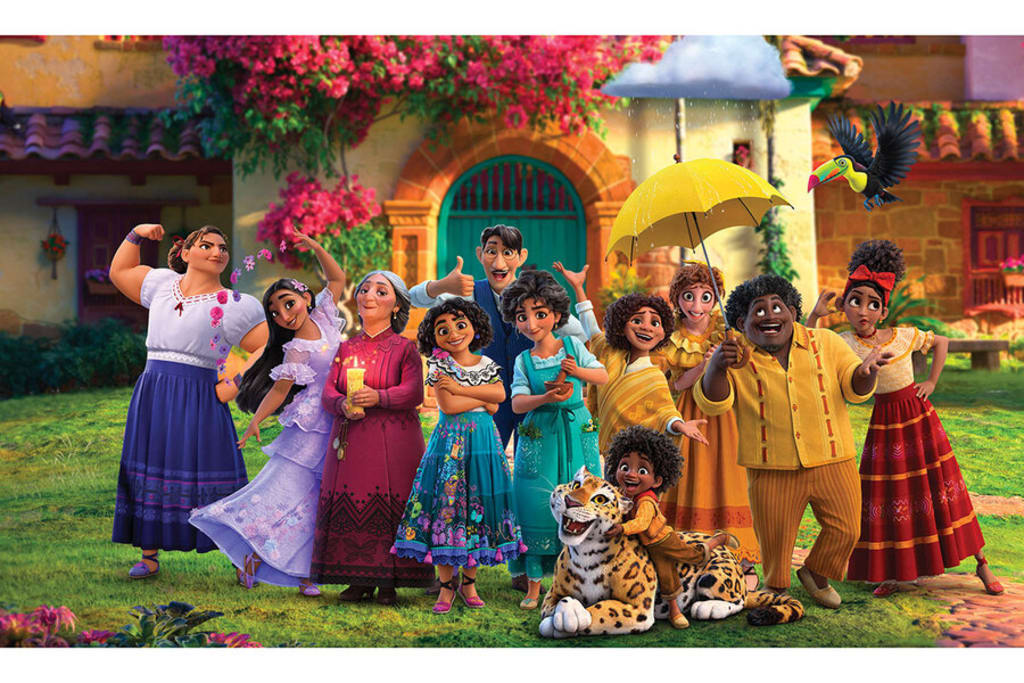Different Roles in Toxic Families
Which Encanto character are you?

I already talked about Disney's new animation movie Encanto and what it has to say about toxicity within a family. But because this movie is brilliant, it doesn't stop there. The movie made sure to portray the different roles people can take on in these problematic households and utilizes the concept of superpowers to its full potential when the powers of the Madrigal Family correlate perfectly to the tasks they have to fulfill in their toxic family dynamics.
I want to clarify that I am no psychologist nor would I call myself a prodigy in the psychological field. I am just interested in different social dynamics, and especially in the dynamics between family members as I myself had a rather interesting upbringing. These are my definitions of the different roles as to my best understanding of them; and my ideas on how they correlate with the characters of the movie.
With that said, prepare for a deep dive into the layered and complicated roles in toxic families and hopefully get a clear understanding of them through the characters of the Madrigal Household.
The Caretaker
Starting off strong with the Caretaker. In toxic family dynamics, it often comes to arguments or full-blown fights. Situations escalate quickly and the Caretaker of the family takes it upon themselves to restore peace and fix whatever the issue might be. It gets problematic when the Caretaker is ready to overlook the actual problems and refuses to address them in order to keep the peace. At a certain point, a Caretaker can prevent a family from moving forward and healing.
The Caretaker is a very common role in toxic families and is presented by Julieta Madrigal in the movie who literally has the ability to fix people's injuries with her baking. A Caretaker, indeed.
The Hero
The Hero is very similar to the Caretaker. Whereas the Caretaker feels like they have a huge responsibility to fix things, responsibility is actively thrown at the hero. They are considered the strongest. Whenever a problem arises they are supposed to take care of it. And because of that, they adapt to their role and are very mindful to always look fine on the outside while they may crumble underneath the pressure. This perfect facade helps the family to keep the illusion that everything is fine. Along with the responsibility comes also huge loneliness and troubles to share feelings for the Hero.
Got it? Under Pressure? I am of course talking about Luisa Madrigal who even has her own musical number singing about the pressure of being the strongest.
The Scapegoat
Within a toxic family, a scapegoat is often needed. Someone to put all the blame on for whatever is going wrong right now, although they have nothing to do with the issue whatsoever. This role can easily fall to the person who is aware of the problems in the family and tries to address them.
Clearly, this describes Bruno Madrigal whose whole character builds on the idea that he is made responsible for the bad things he sees in his visions although he has no influence on them.
The Mascot
The Mascot is a tricky role because it doesn't seem too bad at first. Their function is to make people laugh; to brighten the mood, and to make the rest of the family forget about their problems. However, in order to achieve this goal, the Mascot is ready to transform into whatever the family needs at the moment; and without any care for their own needs. It often leads to a distorted self-image or even a lack thereof.
The movie could not have been any more on the nose with this one and Camilo Madrigal whose power is shapeshifting and to become literally whatever the family asks of him.
The Golden Child
A golden child is someone who cannot do wrong. They are favored by their guardians who praise them constantly over everyone else. By the way, most of the time the things golden children are praised for are the things the guardians admire about themselves (or what they wished they had). In this situation, the main goal for the golden child is to stay in this role for as long as possible in order to avoid the same abuse everyone else around them has to endure. Sometimes, they even adopt the mannerisms of the abuser or participate in toxic behavior themselves. With this goal in mind, the golden child has no opportunity to ever truly form a personality outside of the facade created for this role.
This one is rather obvious as well as Isabella sings a whole song about her struggle to constantly stay perfect to a point where her powers start to reflect her wish for growth.
Gaslighting Technique
This is less of a fixed role and more of a common technique used in toxic dynamics. The (emotionally) gaslighting. The term Gaslighting is used in general when Person A tries to change person's B perception and/or memory of something. This can be an event, an argument or even one's own emotions.
For example, whenever you feel sad or angry or mistreated by the people around you - often your parents - they start to tell you to just… stop. Stop feeling that way, stop making such a big deal out of it, stop imagining things they did not do (but did), and so on and forth. And when your emotions don't get recognized or validated by your caretakers it can lead to a lifelong damaged relationship with your feelings and arguably bad coping mechanisms.
Peppa Madrigal represents the effect of emotional gaslighting perfectly as she gets constantly told throughout the whole movie to stop feeling the way she does because it affects the weather. Stop being sad, you make it rain. But does anyone ever ask why she's feeling sad?
The Therapist
The Therapist is also a very common role in toxic family dynamics. Their whole deal is basically to listen. This happens often between young children or teenagers and parents who are out of their depth and use their children as an outlet, as someone who will listen to all their problems. Money issues, mental health issues, relationship issues; it is all thrown at the child. It will start with little things until they get pushed into the role of their caretaker's therapist over and over and over.
For the first time, the analogy doesn't fit quite well but I think a point can be made for Dolores Madrigal in the position of the Therapist as she unwillingly has to listen to everyone's problems all the time.
The Lost Child
The Lost Child tries to stay as much in the background as possible to avoid any attention and possible abuse. As a result, they may have difficulties developing social skills and problems with self-esteem which leads to a bit of a loner lifestyle.
This one is a little bit far-fetched, but I would argue for the literal child of the cast, Antonio Madrigal. He is shown to be overwhelmed by all the attention and pressure coming with his ceremony while his power to talk to animals can be read as a fear of human interaction.
Take this with caution. Not every toxic family needs to fulfill all of these roles and not every dynamic can be broken down that easily. Real-life relationships are layered and complex and often cannot be simplified.
Do I think the movie producers had all this in mind while working on the script of Encanto? To be honest, probably not. But I like to imagine they did look some stuff up (I mean, these often occurring dynamics have names for a reason) and tried to incorporate as much as they could.
Check out my other movie-related articles: Encanto and Toxic Families or Accio Nostalgia - Harry Potter and the 20th anniversary
About the Creator
M.J. Rausch
Geek, wannabe pedagogue and relationship Guru. Come and laugh at me - I mean with me
Enjoyed the story? Support the Creator.
Subscribe for free to receive all their stories in your feed. You could also pledge your support or give them a one-off tip, letting them know you appreciate their work.






Comments (1)
I feel like Bruno would be the scapegoat AND the lost child (Due to him hiding in the walls of the casket bc he was overwhelmed and trying to protect Mirabel)